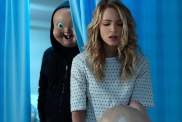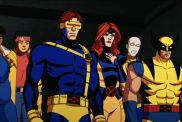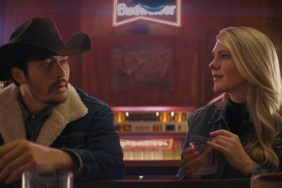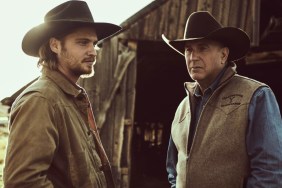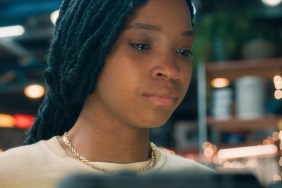On his new interview show with horror vets

This week, a new series made its debut on FearNET called Post Mortem. The series pulls creator and host Mick Garris back to his roots when – before he went on to direct films like Sleepwalkers, Riding the Bullet and The Stand – he used to host the Fantasy Film Festival program, a talk show that would put him face to face with horror industry pros.
Those writers, directors and producers would later go on to be colleagues and friends. For Post Mortem, Garris is reunited with some of these masters of horror for candid and insightful interviews akin to what you might find on Charlie Rose or Inside the Actor’s Studio.
Garris has completed eight out of 10 episodes so far. We caught up to him shortly before the debut of the first installment featuring make-up FX vet Rick Baker.
Ryan Rotten: I find it strange and unusual to be talking to a journalist turned director turned temporary talk show host…
Mick Garris: [laughs] You know, it’s a Twilight Zone I find myself residing in.
Rotten: From the previews, it looks like you’ve got some meaty stuff.
Garris: I hope so. I hope the difference between having a filmmaker interview filmmakers rather than Entertainment Tonight or coming from a kid fan like I was doing the old shows, hopefully that will make a difference.
Rotten: What was the impetus behind wanting to do this?
Garris: Well, before doing it it felt really bizarre, but actually doing it it felt natural. The difference being, at the time I started doing the old shows, I was a fan and not a filmmaker. I was a hopeful screenwriter. What’s strange is the guests we have on Post-Mortem are the guests I had on Fantasy Film Festival, like Carpenter, Landis and Corman, but hopefully we have the perspective that being a filmmaker myself will make it more interesting for questions and not soundbyte questions, where we can talk about people of the genre who are fans of the genre, but also working within the trenches. Careers that continue on rather than looking back on a career. Talk about how things are changing. That’s what a lot of these conversations have, too, with the people who have been doing this for a long time. How are the tools changing? How are the audiences changing? How are the tastes changing? It’s as entertaining for me as for anybody, I hope.

Rotten: Setting aside your friendships with many of your interviewees, did you find it easy to get these guys to open up for the show?
Garris: They’re incredibly open. John Carpenter is the most willing to say whatever is on his mind about anybody. I think our friendships go beyond just the working capacity, a lot of these guys I’ve been friends with for years and years. So I think they feel comfortable. It’s just a one-on-one thing. There’s no audience, it’s just a set. It’s very casual. They’re very forthcoming. They’re not being asked the same questions over and over. Some of the things, you know as an interviewer, there are those questions you have to ask to get the ball rolling. There are subjects I don’t want to ask, “What do you think about sequels?” But I want to talk about that? I want to get that perspective. Sequels, remakes, all of that stuff. Then there’s test screenings, dealing with a studio, doing an independent. We can come from similar places so it makes them comfortable.
Rotten: Out of the eight episodes you have in the can so far, who were you the most eager to get in the chair? And who was the most surprising, aside from whatever Carpenter said?
Garris: I knew Wes Craven, John Carpenter and John Landis would be the most verbally comfortable, the most entertaining and have the most incredible stories. Wes is unbelievably articulate. All of them are. Tobe Hooper is a guy who isn’t normally comfortable doing interviews. But I think he was at ease in a way you don’t often see. A lot of what he had to say was quite surprising. Nothing Landis had to say was surprising because I expect the unexpected from him. Carpenter has this wonderful sense of been there, done that. I said to him, “You were a John Ford fan.” And he says, “Yeah, I used to be but I look back at those movies and they’re beautiful but he’s such a reactionary.” It’s like you can’t say what you think about the idols of Hollywood, but Carpenter just says what he thinks. And Wes is like the professor of horror. He’s so well-spoken and thought out. We do over an hour for each interview, then cut them down to a half hour for VOD, then the webisodes are three to five minutes. The webisodes will sometimes be exclusive stuff, not in the half hour. The half hour has a lot of stuff not in the webisodes. It’s great to have that much material.
Rotten: Is there going to be a point where we’ll find you in the hot seat?
Garris: Not on my show. [laughs] The good thing is there is an exchange. So it’s not just me asking questions. Sometimes one of the guests will bring up stuff I’ve done, but this is about them, the way they work, their opinions. Directors never really work with one another, but this is a way to see how people work differently.

Rotten: Is there a Post-Mortem DVD release coming?
Garris: We’ll do that and probably put the whole unedited hour on DVD. That will be something I do, I actually maintain the rights for DVD and international. We’ll probably start working on that in the next couple of weeks.
Rotten: Did you ever revisit your old interviews in preparation for this?
Garris: They embarrass me. I used to watch them, but they’re out there. If you do something public you have to lack the ability to be embarrassed. For this I do a lot of homework and go over their careers. I’ll have 30 questions and sometimes only five of them get covered. It becomes a conversation. Thatâs what I wanted. Great conversation takes a while to get going and feel comfortable. You do a Daily Show or Today Show interview, you’ve got three minutes and then you’re done.
Source: Ryan Rotten, Managing Editor


